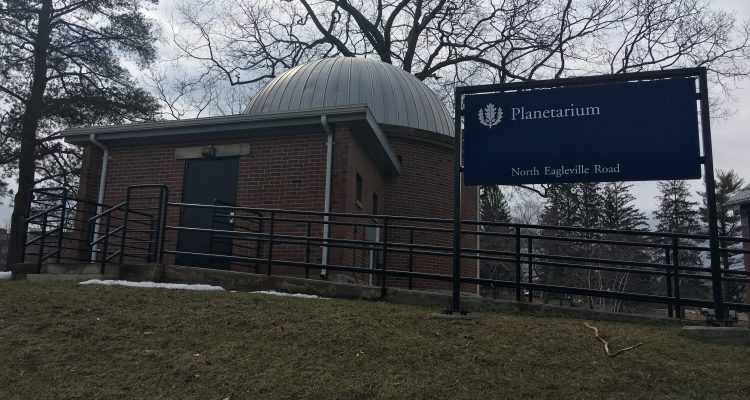By Daniela Doncel and Daniel Ruskin
Have you ever experienced the magic of space for yourself? If not, you’re missing out: University of Connecticut students see the planets and stars in all their beauty several times a week from a fully-functional observatory right on Storrs campus.
The field of astronomy is growing on the Storrs campus with new astronomy faculty, astronomy-related research programs and clubs and the launch of an astrophysics minor next year.
Astronomy is not new to UConn. In fact, the observatory used by the university today dates back to the 1960’s. Although astronomy has always had a home in Storrs, the university recently decided to ramp up their participation in the field, according to Physics Professor Jonathan Trump.
“Two years ago, there were no astronomers at UConn and the physics department decided to invest and start an astronomy research program as well as an astronomy academic program… The UConn physics department hired three astronomers, I’m one of those three. So, they went from zero astronomers to three and sort of said ‘okay guys, bring us a new astronomy program,” Trump said.
Trump said that the new program has seen immense success. There are already 20 undergraduate and graduate astronomy researchers working for the department and over 125 students are taking Introductory Astronomy (Physics 1025) this semester – a figure that reflects substantial growth from previous years.
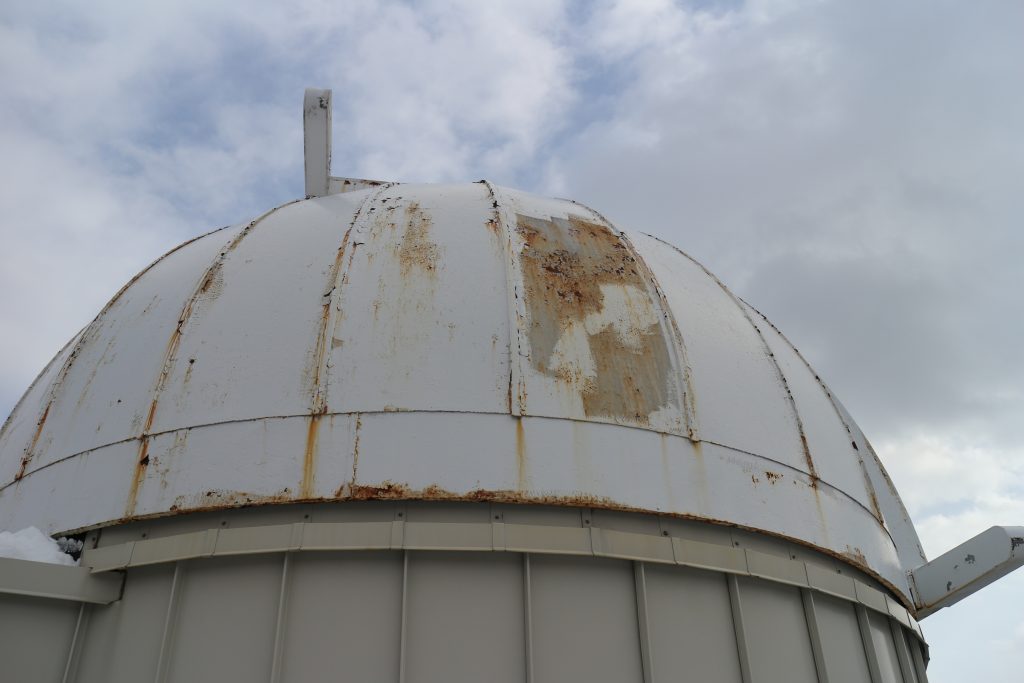
The Physics Department hosts observing sessions typically at 9 p.m. throughout the week, according to the UConn Physics Observatory website.
Photo: Daniela Doncel
According to Trump, there are a number of ways to participate in this exciting field on campus.
“If [students] want formal, in-the-classroom training on observing, then Physics 1025 is the way to go – this is introductory astronomy. Now if instead, they just want to go for fun, maybe they have some interest in astro-photography, then the astronomy club is the place to go,” Trump said.
The astronomy club is run by co-presidents Trevor Svec and Zane Grady. Svec and Grady are both seniors at UConn; Svec is a computer engineering major while Grady studies materials science and engineering.
Svec and Grady trek up to an observatory on the top of the Physics building almost every week with the astronomy club, where they make use of a number of portable and stationary telescopes. They can observe and photograph distant objects such as the moon, Jupiter and countless other celestial bodies.
Grady said the club has seen a dramatic increase in student interest over the last few years, especially from non-STEM (Science, Technology, Engineering and Math) students.
“We definitely attract a lot of astronomy or STEM-minded people – but then what’s more interesting is as places like SpaceX and NASA run more flagship missions, and people get more interested in space, we’ll get a lot of people who just have a cursory interest in space and space technology, and we’ll get people from all over – the arts majors, our treasurer is a business major … we have some political science majors,” said Grady.
The club welcomes all UConn students to join them for observing sessions and other events.
“We’re actually planning a SpaceX launch party in like a few weeks … we really just want to get everyone together and enjoy watching that launch,” said Svec.
The SpaceX event will feature a livestream of the rocket launch and a conversation about the future of space exploration. The event is set to take place on March 28 but the date could change depending on launch delays.
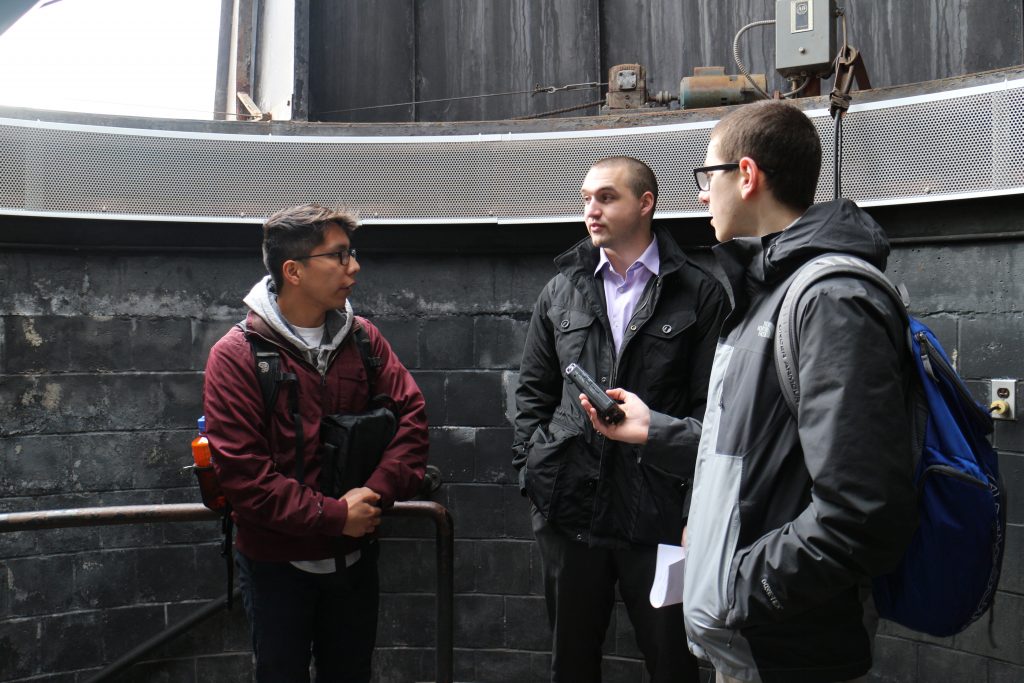
Zane Grady left), Trevor Svec (center) and Daniel Ruskin (right) converse inside the UConn Physics Observatory.
Photo: Daniela Doncel
The physics department will be launching an astrophysics minor next year, according to Trump.
“We did start a new astrophysics minor – this is for students who really want to dive deep into astronomy and astrophysics. There’s a lot of math involved in these courses … but if you’re really interested in a deep dive in modern, cutting-edge astrophysics research – like the three of us faculty [are] – that’s the path you want to take, looking at this astrophysics minor … starting next year,” Trump said.
UConn is home to high-quality equipment such as lunar and solar telescopes. Astronomy and Physics faculty also use well-known equipment such as the Hubble and Chandra telescopes for research purposes.
The Hubble is the first major optical telescope to be put out to space, according to NASA.
“You know, unfortunately, I don’t get to go visit these telescopes – every astronomer wishes they could be an astronaut. But I do get to tell Hubble what to do. Hubble actually has a Twitter account – and if you look at the Twitter account between March 15th … and May 15th, once every other day, it will tweet and say ‘We are looking at this particular field in the sky for Professor Jonathan Trump at UConn”, Trump said.
While regular students don’t get to use Hubble, they do get to use the observatory on the Physics building roof. The observatory has a large, stationary telescope that dates back to the 1960’s. The astronomy club as well as Introductory Astronomy students visit the observatory to use this telescope whenever weather permits.
The astronomy club also uses thousands of dollars of portable equipment including modern telescopes, DSLR cameras and high-powered laser pointers.
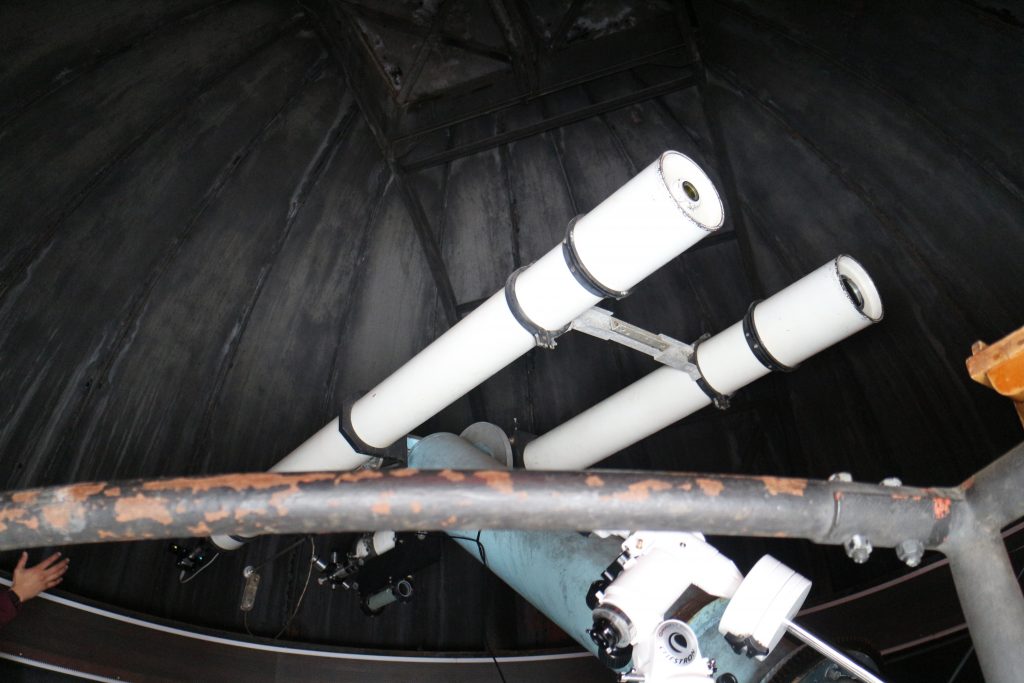
This telescope sits inside the UConn Physics Observatory on top of the Physics Building. The roof opens up for observing the night sky.
Photo: Daniela Doncel
Until recently, a planetarium near the Chemistry building has also been used by the Physics department and astronomy club.
A planetarium is similar to an observatory, but while observatories look at the night sky directly, planetariums project pre-recorded images onto a large screen, according to Trump.
The planetarium is currently not functional, Trump said, but plans are in place to revamp the facility.
“Some of the components actually have been failing – some of the old black mercury vapor lamps, things like this. And they’re actually not manufactured anymore. And so we’ve shut the planetarium for now, and we put in a few proposals to try and do something new with the planetarium,” Trump said.
Trump said he has proposed the creation of a new, modern planetarium. The new facility would be powered by computers and would be able to project captivating 3D models of things like the interior of the earth, the inside of a cell and – of course – space.
Plans for the planetarium are being seen not only on an administrative level but also on the student level.

According to the UConn Physics website, the planetarium was built in 1954 by Provost Al Waugh, and it is the oldest planetarium in Connecticut.
Photo: Daniela Doncel
President of the physics club, Tyler Metivier, said he hopes to begin a collaboration with the astronomy club where the students can work together to take care of the planetarium.
“This may be something we [students] could take care of with funding from physics club and astronomy club, just, getting a new system. There are digital planetarium systems now that you can install that aren’t incredibly complex… I think that’d be really cool to update. Planetariums are so cool… It’s so easy to educate people about constellations, positions of stars, things like that,” Metivier said.
Metivier is a sophomore studying physics and is conducting an astrophysics research project with Dr. Kate Whitaker, an observational cosmologist. The project is funded by NASA through the Connecticut Space Grant Consortium.
Metivier said he is grateful for the platform UConn has given him to work on the project he loves.
“It’s been fantastic and it’s also been the hardest thing I’ve ever done in my life,” Metivier said, explaining that there is a pressure to do well when signing on to do research.
Metivier said overall, it seems like the university cares greatly about the STEM field.
“I know the university is building us a brand-new, state-of-the-art building and if you walk through the physics building now, if you walk into my lab, it’s a lot of broken pipes and a fume hood that doesn’t work… Knowing that we’re getting an entirely new building with new labs and really nice technology, I wouldn’t be offended if [UConn] said the planetarium is not our top priority,” Metivier said.
Trump said the Digital Media and Design department has also expressed interest in the new planetarium.
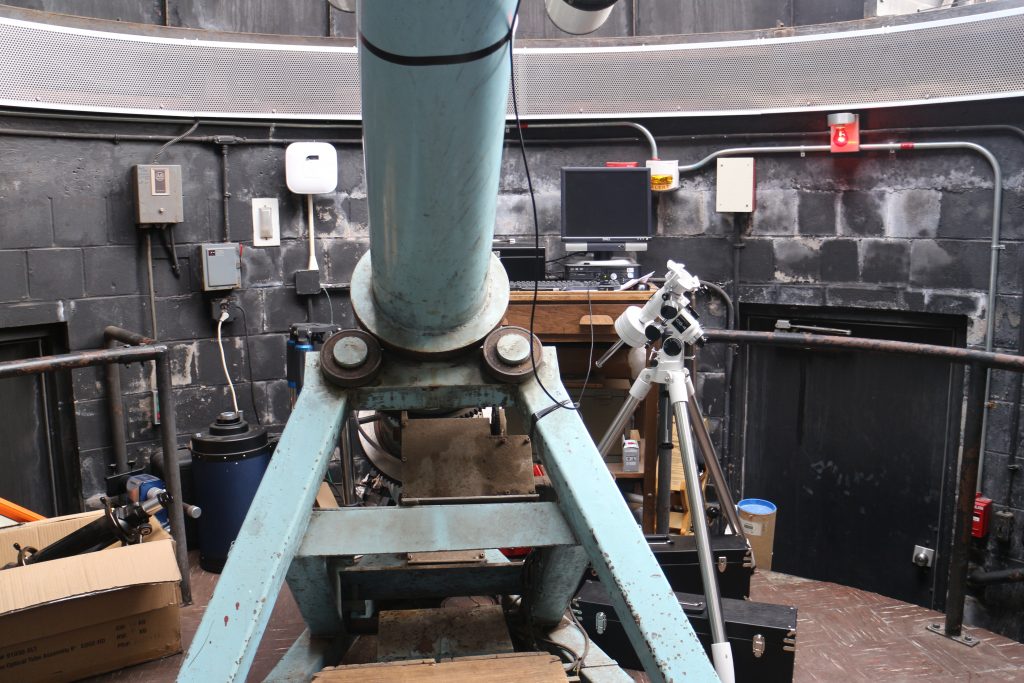
Though still functional, astronomy students and faculty hope for a newer location for observation sometime in the future.
Photo: Daniela Doncel
Trump and his team have also begun the process of revamping a new, off-campus observatory with more modern and powerful equipment. This upgraded observatory would help astronomers get away from the light pollution on campus, allowing for higher quality images.
Overall, Trump emphasized that it is an exciting time for astronomy and astrophysics – both at UConn and in the greater academic context.
“Many of the most important ideas and questions and mysteries in Physics are happening right now in astronomy and astrophysics in particular. It’s a pretty exciting time to learn more, and we’re always open to new students who are interested in astronomy – in particular, to take them up to the roof to do some observing. … This is a very fun job to have, my job as an astronomy professor,” Trump said.


